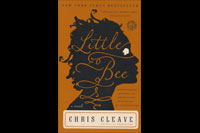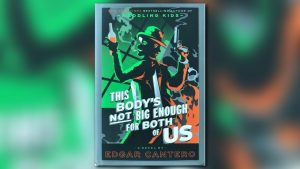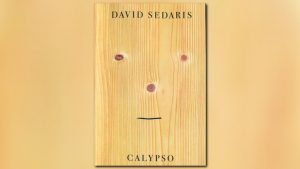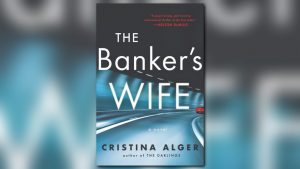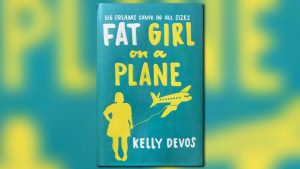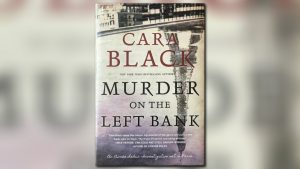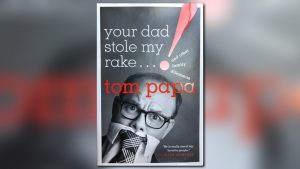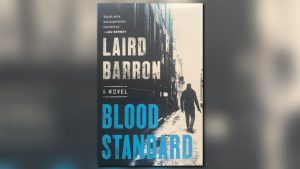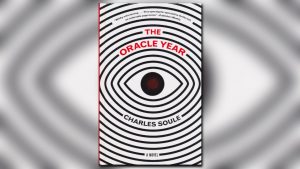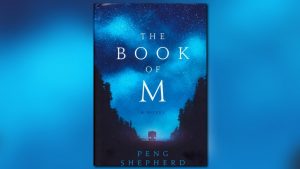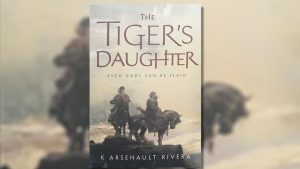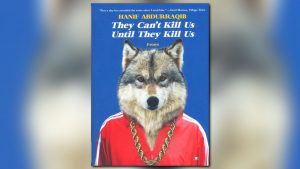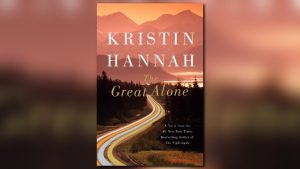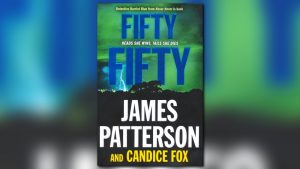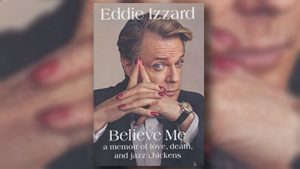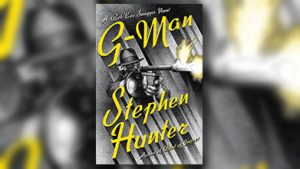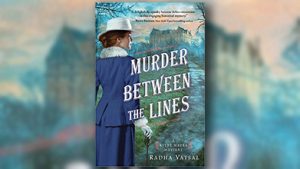“Little Bee,” smart and stoic, knows two people in England, Andrew and Sarah, journalists she chanced upon on a Nigerian beach after fleeing a massacre in her village.
After sneaking into England and escaping a rural “immigration removal” center, she arrives at Andrew and Sarah’s London suburb home only to find that the violence that haunts her has also impacted them.
Alberto Rios: Welcome to Books & Co. Welcome to all. I’m Alberto Rios, your host. We are joined today by Chris Cleave, noted novelist and journalist, who will be talking about his second book, Little Bee – a story about how a young Nigerian girl's life intertwined with a British woman. It's published in the U.K. as The Other Hand. Welcome, Chris.
Chris Cleave: Thank you very much for having me on.
Alberto Rios: Before we open the book and enter it, I’d like you to tell me a little bit about how books come to be, how this one in particular was the book it would be in your life.
Chris Cleave: Sure. So this is a story about refugees, and a story about a girl from Africa who's called Little Bee. She's from Nigeria, a complex, beautiful and very troubled country at the moment. She's a refugee. She flees from something that happens to her in that country. She comes to the United Kingdom, meets a woman called Sarah. She's a very privileged Londoner. The two form a friendship and it turns out both of them have something in their lives they really need saving from. It's a story about refugees, people needing other people's help in order to be able to survive. And there was a very particular reason that I wanted to tell that as a story. It comes from a couple of things that happened to me. I guess the most significant thing that happened to me in my life as a wake-up call –
Alberto Rios: You personally?
Chris Cleave: In my personal life – was when I was 22 years old and I was a student. I was working summer jobs to pay the rent. And we would walk to a muster point where they would put us into a minibus and drive us to whenever the work was that day. Usually it was casual labor or kitchen work, anything really, we didn't mind.
Alberto Rios: We're certainly familiar with that here in the Southwestern United States.
Chris Cleave: Yeah. And it was pleasant to work. And then one day the place that they drove us to was unbelievable. They drove us at 6:00 in the morning through this beautiful Oxfordshire countryside with the mist coming over the fields. We drove through a perimeter fence with razor wire and then another. We were exchanging looks. It turned out to be a prison, a very specific kind of prison. It was an immigration detention center for people seeking political asylum in the United Kingdom. I had no idea this place existed. People generally don't. They are really quite secretive about these facilities. Our job as the casual labor was to work in the kitchen of this place. I was chopping potatoes, boiling potatoes, mashing them up and serving them to asylum seekers. I would serve food to people from Sierra Leone, from Rwanda, Bosnia, and all the places where there were conflicts at that time. I got talking to some of these guys and some of them had amazing stories. Some of them were very likeable people, some really messed up by what they had gone through. I was amazed by it. As a writer, when you stumble upon a story that's that big, there's an absolute compulsion to tell it.
Alberto Rios: As a writer, you made literature out of this very difficult, sort of sensitive – you're calling it a prison. I’m sure that the detention center, all of those things, it was a prison indeed. Those stories are lived stories, certainly not in the province of the novelist normally. They are not invented. People lived these lives. The question arises then, should they write their own stories? How do you get to write their story? How does that work out?
Chris Cleave: Yeah. What I discovered when I met some of the people, and I interviewed some of the people years later, not the same people I met originally but a new batch of refugees and asylum seekers I spoke with when I was researching the novel, I was struck by how good they are at telling their own stories. And here's why, I think. For a start, they tend to be – people who have escaped from horror tend to be the most resilient, the most resourceful, the most persuasive, they have managed to get through borders and walk across continents. I met people who had walked to London from sub-Saharan Africa. That's a long and difficult journey, and had stowed away on a boat to cross the bits of sea involved. But they get to a point where they have a huge story to tell. And many of them are extremely good at telling it. There are some very good sort of true-life stories of people who have told their own stories. There's a book called "A Long Way Gone," by Ishmael Behr, a boy soldier in the conflict in the Sierra Leone. He tells his own story beautifully. I met people who don't, can't, couldn't. It's not something that everyone is good at, telling their story. Some people are just better at living. Some people are also very traumatized by what had happened to them, just didn't feel like talking about it. I think something you can do as a storyteller, which I am, is to try and tell the biggest story you can find about people's lives, try to make it as respectful as possible. You have to do justice to these stories. You can't write a book that doesn't achieve the same level of intensity that their stories have. You've got a real duty to be truthful, honest, and to find – although it's a fictional story, you have to stick to the emotional truth of their experience.
Alberto Rios: Well said. I think that very specific word, the notion of justice. Pablo Neruda says as writers we must lend ourselves out and not write what we choose to write, but what others need telling. I think that's what you're talking about here. You go about this in a very curious way. You give us two distinct narrators. As we open the book, we first are faced with the narrative of Little Bee, the young Nigerian girl. We don't know that the second voice is coming, the voice of Sarah, the British woman that she encounters. Tell me about that decision, because that's a striking opening. And what's wonderful is you work with language throughout, but you're having to work with two very different kinds of language. But it's all in English, but Little Bee is struggling with learning it. The second character is struggling with the fact that she knows it, but what good is it. Great.
Chris Cleave: Yeah, it's a story about boundaries, national boundaries, emotional boundaries, physical, racial, and political boundaries that are transgressed by those two people. We have these borders and barriers put up between ourselves and people don't generally cross those sort of physical or emotional borderlines. But these characters do. The weird thing about a border, it looks very different depending on which side you are on.
Alberto Rios: That's true.
Chris Cleave: When you are on the safe side of that border you almost don't notice that it exists. When you're on the dangerous side of that border, it can seem like the highest and most impossible barrier on earth. When you are telling a story about borders, emotional, human, physical, and people that transgress them, you really need to see that from both sides. I really wanted to take two perspectives, not a big voice of god viewpoint looking down on the little people moving around. I like to put the reader right in the mind of the character, almost as if they are a copilot in that character's brain. They can ask themselves, okay, this is what the viewer is like, what would I do? I love to put them in Little Bee's mind and then in Sarah's mind. And they are looking at two very good and very likeable women, seeing it from completely different perspectives. They slowly converge, as you alluded to, through the language. At the beginning, although Little Bee is speaking English and Sarah is speaking English, well, there's English and there's English. This is something I discovered when researching the book. Just how many registers and flavors of English there are in the world. And two things: one, how beautiful that is. Something like Nigerian English is English plus, 10,000 words of extra vocabulary, plus a rich stock of idioms and proverbs that give it flavor, which is very beautiful. So there's a proverb that I finished the book with, a Nigerian proverb that says, if your face is swollen from the severe beatings of life, smile and pretend to be a fat man.
Alberto Rios: You also have the very funny little adage in which you talk about the proverb with the wolves in it. Could you speak to that? That was a very funny moment where you're not only dealing with this in an even-handed way, you're also playing with us as readers.
Chris Cleave: This is the great thing about having smart readers. I always feel I’m writing up to my readership and I can play jokes. They can laugh while understanding the seriousness of the situation. You can play with it. As Little Bee is crossing this boundary, which turns out more than anything to be a linguistic border, she has to move to speaking the Queen’s English in order to be accepted in the host country.
Alberto Rios: A very literal Queen, by the way.
Chris Cleave: As she's doing this, she plays games with the language because she's aware of the sort of sadness of losing her language and she makes it bearable by riffing on it a bit. She has this – the proverb you spoke to, she invents Nigerian proverbs in order to give herself an air of wisdom.
Alberto Rios: It's a very funny one, too. Do you remember it?
Chris Cleave: Yeah, she says, a dog is a dog and a wolf is a wolf. That is the proverb in my country. They are talking about how a leopard can't change its spots. They are talking about another character in the book. “Yes, a dog is a dog and a wolf is a wolf and one can never change from one to the other.” And Sarah, the English character, is impressed by the wisdom of this proverb. Then Little Bee says, of course that isn't a proverb in my country. Why would we have a proverb about wolves in Nigeria?
Alberto Rios: It was a very, very funny line.
Chris Cleave: But it was an interesting register to write in. It almost assumes an air of mysticism. If you say something is a proverb, whether it really is or not, it assume a kind of gravity you wouldn't give to normal prose.
Alberto Rios: Where does the line show respectful too much? I'd like to remind our viewers you're watching Books & Co. I’m Alberto Rios, your host. We're joined by Chris Cleave talking about his book, Little Bee. I would like you to perhaps read a little moment. Not only are you articulating this sense of difference between these two characters, this African young girl and this British woman, but you go beyond the short notion that it's just a conversation, you know, that these two people are speaking. It's a cultural conversation and personal conversation both. After we get past the initial sense of black and white and that sort of thing, you help us to see in the writing. And the writing, I want to say, does two things for me, both as a reader and as a writer. I find it extraordinary. You tell a great story, that's what we want all great novels to do. You also write a great page. That is the joy of some books versus others. We can stop anywhere and glean something in and of itself, right there in that moment and be changed by it, and still know that we've got the whole book to go. I was struck by this one little moment where you show how even dreams are opposites. So you're working in this – so often in this sense of a photographic negative. Two worlds taking the same photo: one seen in the positive values and what we quote as negative values. This is a particularly good example, in that first chapter, in that first paragraph.
Chris Cleave: I like this paragraph, thank you. “What is an adventure? That depends on where you are starting from. Little girls in your country, they hide in the gaps between the washing machine and the refrigerator and they make believe they are in the jungle with green snakes and monkeys all around them. Me and my sister, we used to hide in a gap in the jungle, with green snakes and monkeys all around us, and make believe that we had a washing machine and a refrigerator. You live in a world of machines and you dream of things with beating hearts. We dream of machines because we see where beating hearts have left us.”
Alberto Rios: That's wonderful. That leap from what we think we know to what the other side is elemental to the book. I think we find it throughout. It changes the characters and changes us as readers, as well. When I say you were writing a great page, you're using not just the devices of prose fiction but perhaps the devices of poetry, things are a little extraordinary for a novel, in that you stop the narrative in order to take time with the moment. And it's time that deserves to be taken, you are bold as a writer in stopping us and saying, pay attention right here, don't just keep going by in a heartbeat. Were you aware of using these poetic devices along with what you would normally do as a novelist?
Chris Cleave: I think I’m quite naughty as a writer. I don't really respect the flow of time through my writing.
Alberto Rios: Okay.
Chris Cleave: I break it up, I slow it down, I rewind a lot. And the story that I’m telling is not a linear story, it's not this happened and then that happened as a consequence of that. My story happens in an emotional moment – moments that flow one from the other, not in a logical or temporal order. I don’t think I’m conscious of writing particular techniques as I’m writing them. What I do is refuse to let life boss me around as writer. Almost the only value one has as a novelist is to say time isn't real and you can stop it, take a piece from here and put it there and examine it from all sides if you find it beautiful. And if you think your readers are smart, you can hold it up to them in a particular way and say, oh, look, isn't this beautiful? Can we all agree this is a moment that exists outside the narrative? And then you step back into it. You have this big thing about a novel being an instrument. It's not just telling you a story, it's showing you the world in a different way. I think a novel is the most amazing machine that humans have invented so far for making something very, very big small enough to see. For putting the whole of time and space into a little moment. You don't need a reason. The story is just a great excuse to bring people to this party where you can stop and turn down all of the dials of the big conveyor belt that whips us through time and space.
Alberto Rios: A great way to conceptualize it, this notion of a machine. And you have a way of conceptualizing this stoppage as something beautiful you might examine. There's a lot of atrocity by taking the “cute” from Little Bee, atrocity as an odd kind of – “beauty” is the wrong word. We can take it as something to be viewed, that we live through it. She has a wonderful line about trouble, don't be surprised by it. Do you remember that?
Chris Cleave: Yeah. She talks about horror, she talks about trouble.
Alberto Rios: It’s a big part of the book, the plot of the book has to do with certain kinds of horror that are inescapable for her.
Chris Cleave: She talks about horror and the difference of what horror means to us and in the lucky world, and to her in the world that she's come from. Horror is something she has had to live with every day. Horror for us is – she has this line, it's something that we in the west need to give ourselves a regular dose of to remind ourselves that we're not suffering from it. She talks about horror films and horror movies and these things that remind us of the darkness inside ourselves without actually having to live through it in the way she has.
Alberto Rios: She has that great line: “I’m telling you, trouble is like the ocean, it covers two thirds of the world.” And that is her perspective. She articulates it well. She parses it out through language and she struggles with it. One of the great devices that you use in doing this, you keep having her say, here's how I would explain it to the girls back in the village. Really, she's explaining it to us as readers. I think that's an incredibly useful device, in that she takes time. Because perceptively, she's relating it to these other young girls who aren't going to know how the world works. We think we know how the world works but she is educating us in that moment.
Chris Cleave: Yeah, that was a really useful device. Rather than having her look straight at the camera and pop out of the narrative and explain to us that there's something she understands now but didn't understand a few days ago or 10 days ago, she does, she imagines in her head conversations from the girls back home. Really, we're just talking about her past self. She's alluding always to the flow of herself through time and the way her language is changing. You have to find ways to do that.
Alberto Rios: This is a very good one. Your first book, Incendiary, was made into a film starring Ewan McGregor and Michelle Williams. I have to think this book is similarly fated.
Chris Cleave: Yeah, it's going to be made into a movie. BBC Films wants to make a movie out of it. Nicole Kidman is really interested, as well.
Alberto Rios: You've got some big names already attached to that.
Chris Cleave: She's going to be fantastic as Sarah. And to have BBC Films doing it is exactly, you know, where you want to be as a writer, having someone address your book at that level.
Alberto Rios: Little Bee is a character. If we can kind of summarize here, through all of this strife and difficulty in her life, has a sense of equanimity that is hard-earned. We hope for good things for her, we certainly won't give away the ending of the book, which is open to a lot of ways of being conceptualized. But it was a brave book and she is a brave character. In harder measure, we don't know how brave to view Sarah. We are used to Sarah on some level as readers of, let's say, novels. Those who would be literate and could read novels are probably going to be more used to Sarah. Little Bee is a new entry, an exciting character and I thank you for creating her.
Chris Cleave: Thank you very much.
Alberto Rios: Do you want to say one last thing about this? We have this little kid Charlie dressed as Batman. He is a superhero, he's Sarah's child. Is that a speech or a reference to a next generation?
Chris Cleave: What a great question. Yeah, I write about people because I like people. I’m not one of those writers that's down on humanity. I think we're great. We do have a huge capacity for compassion as human beings. Everyone I meet pretty much I like on one level or another.
Alberto Rios: What a great thing.
Chris Cleave: And that's a great reason to be a writer. Charlie, the child character for me, is a great reason to be positive. He's in the book for a reason. I’m talking about a big story. Five billion people in the world don't have very much. One billion have quite a lot and there will be refugees. This is an important problem to fix because there's another generation of children growing up and we want to give them a world that's fairer, more just and happier. If we want to solve it in a positive way, then we can solve that. The way to remind us is to think about children and the world they grow up in.
Alberto Rios: In Charlie’s vernacular, “you is a goody, not a baddie.” Wonderful, congratulations on the book. We've been talking today with noted journalist and novelist Chris Cleave who has been talking about his book, Little Bee, which will soon be made into a movie. I want to thank you for joining us. This has been Books & Co. I’m Alberto Rios, your host. Please join us again next time when we'll be back with another good book.
